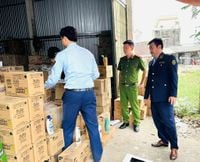On May 9, 2025, the Ministry of Industry and Trade of Vietnam, in collaboration with the Ministry of Agriculture and Environment, organized a significant conference aimed at promoting trade in agricultural, forestry, and fishery products between Vietnam and the United States. This meeting comes at a critical time as exports of these products from Vietnam to the U.S. face the looming threat of countervailing duties that could reach as high as 46%.
During the conference, Minister of Agriculture and Environment Do Duc Duy emphasized the government's proactive approach in negotiating with U.S. officials to dismantle trade barriers. He stated, "The government is actively negotiating with the United States to remove barriers and find common ground based on harmonizing the interests of producers, businesses, and consumers of both countries." This dialogue aims to create a mutually beneficial trade environment that supports both Vietnamese exporters and American consumers.
To further bolster exports to the U.S. market, the Ministry has launched a project focusing on four key orientations: enhancing transparency in the supply chain and raw material sources, applying digital technology for traceability and quality control, building industry brands with a focus on compliance and sustainable development, and promoting green transformation in agriculture. These initiatives are designed to meet the increasingly stringent environmental standards set by major markets including the U.S., EU, and Japan.
Minister of Industry and Trade Nguyen Hong Dien underscored the importance of the U.S. as a major market for Vietnam's agricultural products, noting that it is also a crucial supplier of agricultural goods like grains, meat, milk, and wood. He proposed several key solutions aimed at fostering sustainable bilateral trade growth in the agricultural sector. These include a thorough review and elimination of unnecessary technical barriers, the establishment of strong and feasible incentive policies, and enhanced connectivity between Vietnamese businesses and their U.S. counterparts. "We need to strengthen the sharing of market information, technical standards, and product quality requirements," he added.
Minister Nguyen also called upon industry associations and the business community to unite and actively seek cooperation opportunities. He stressed the need for a green, clean agriculture sector that can add high value and firmly position Vietnamese brands in the U.S. market. The conference concluded with a commitment from the Vietnamese government to continue supporting businesses in their market expansion efforts, promoting exports, and enhancing product quality.
In addition to the conference on agricultural exports, the Vietnamese government is ramping up efforts to combat trade fraud, particularly regarding the origin of goods. The Chairman of the Provincial People's Committee has mandated relevant agencies to enhance monitoring, inspection, and control measures to detect and prevent the transportation of goods falsely claiming to originate from Vietnam. This initiative aims to protect the integrity of Vietnamese exports and ensure compliance with international trade regulations.
Furthermore, the Department of Industry and Trade is tasked with reviewing existing policies and legal regulations related to the origin of goods. They are to compile findings on challenges faced by businesses and propose amendments to relevant authorities to improve the regulatory framework governing product origin.
Turning to the broader economic picture, the General Statistics Office reported that Vietnam's total import-export turnover reached over 276 billion USD in the first four months of 2025, marking a 15.7% increase compared to the same period in 2024. This growth reflects a positive recovery and sustainable progress in international trade, especially as many major markets show signs of growth.
Notably, the export sector has been a bright spot in this trade landscape, with total export turnover exceeding 140 billion USD, up by 13%. The domestic economic sector contributed significantly, with exports amounting to 40 billion USD, which is an 18% increase and represents 29% of the total turnover. Meanwhile, the foreign direct investment (FDI) sector reached 99 billion USD, an 11% increase, accounting for a remarkable 71% of the total exports.
Among the exported items, 22 achieved turnover exceeding 1 billion USD, with seven items surpassing the 5 billion USD mark, indicating a shift toward exporting higher-value goods. On the import side, the total turnover reached 136 billion USD, representing an 18.6% increase compared to the previous year. The domestic sector imported over 51 billion USD, while the FDI sector accounted for over 85 billion USD in imports.
In terms of new business activity, nearly 90,000 new and returning enterprises were registered in Vietnam during the first four months of 2025, showing a nearly 10% increase from the same period last year. This surge indicates a robust entrepreneurial spirit and a growing confidence in the Vietnamese economy.
As part of the ongoing economic development strategy, the Ministry of Agriculture and Environment reported that the total export turnover of agricultural, forestry, and fishery products reached over 21 billion USD in the same timeframe, with imports nearing 16 billion USD. Consequently, the export surplus in this sector stood at nearly 5.2 billion USD, although this figure represents a 4.1% decrease compared to the same period in 2024.
Moreover, as of April 30, 2025, the total registered capital from foreign investors in Vietnam reached 13.82 billion USD, marking a significant 39.9% increase compared to the previous year. This influx of foreign investment is crucial for sustaining economic growth and enhancing the competitive edge of Vietnamese products in the global market.
In summary, Vietnam is taking decisive steps to enhance its trade relationships, particularly with the United States, while simultaneously addressing challenges related to trade fraud and ensuring the integrity of its export market. The government's commitment to supporting businesses and fostering a sustainable trade environment is evident in its ongoing initiatives and collaborative efforts.




